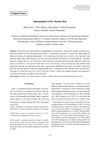2 citations,
May 2021 in “Neuropathology & applied neurobiology/Neuropathology and applied neurobiology” Correct diagnosis and treatment are crucial for effective management of lipid storage myopathies.
2 citations,
June 2016 in “International journal of experimental pathology” Human skin has less GDNF and its receptor with age.
 1 citations,
August 2023 in “Gels”
1 citations,
August 2023 in “Gels” The hydrogel with silver and ibuprofen promotes wound healing and fights infection.
1 citations,
June 2021 in “Journal of pharmacopuncture” CBD may help restore hair growth-related protein levels in alopecia caused by hormones or other factors.
 1 citations,
January 2020 in “Инфекционные болезни. Новости, мнения, обучение”
1 citations,
January 2020 in “Инфекционные болезни. Новости, мнения, обучение” Lack of vitamin D might cause hair loss due to autoimmune problems, and fixing vitamin D levels could help treat it.
1 citations,
November 2011 in “British journal of pharmacology” Enzymes are classified into six types and are essential for many biological processes, with only a few targeted by drugs.
November 2024 in “Biochemical and Biophysical Research Communications” Abnormal gene expression related to keratin causes hair loss in certain mice.
 October 2024 in “Biology”
October 2024 in “Biology” Dermal papilla cells can help regrow hair and are promising for hair loss treatments.
 August 2024 in “Nature Communications”
August 2024 in “Nature Communications” Softer hydrogels help wounds heal better with less scarring.
June 2024 in “Regenerative Therapy” Exosomes from stem cells may help rejuvenate skin and regrow hair, but more research is needed.

Enterococcus faecalis delays wound healing by disrupting cell functions and creating an anti-inflammatory environment.
 May 2024 in “Clinical Cosmetic and Investigational Dermatology”
May 2024 in “Clinical Cosmetic and Investigational Dermatology” Manipulating cell cleanup processes could help treat hair loss.
 April 2024 in “Journal of translational medicine”
April 2024 in “Journal of translational medicine” MJ04, a new compound, effectively promotes hair growth and is a potential topical treatment for hair loss.
 April 2024 in “Pigment cell & melanoma research”
April 2024 in “Pigment cell & melanoma research” Different types of resting melanocyte stem cells have unique characteristics and vary in their potential to become other cells.
February 2024 in “International journal of molecular sciences” Type 3 Innate Lymphoid Cells help maintain skin health and balance, and are involved in skin diseases and healing.
 October 2023 in “International journal of rheumatic diseases”
October 2023 in “International journal of rheumatic diseases” New treatments targeting the JAK signaling pathway, especially JAK inhibitors, show promise for alopecia areata.
 September 2023 in “Medicine”
September 2023 in “Medicine” The research suggests immune system changes and specific gene expression may contribute to male hair loss, proposing potential new treatments.
 August 2023 in “Medical Hypotheses”
August 2023 in “Medical Hypotheses” Metformin, usually used for diabetes, can also help treat hair loss from alopecia areata due to its ability to reduce inflammation and stimulate new hair growth.
 January 2023 in “Journal of Cosmetic Dermatology”
January 2023 in “Journal of Cosmetic Dermatology” Some children may develop hair loss after having COVID-19.
ILC1-like cells can independently cause alopecia areata by affecting hair follicles.
 August 2022 in “Case reports”
August 2022 in “Case reports” Isotretinoin effectively treated a rare scalp condition, but careful drug monitoring and a dairy-free diet were important.
April 2019 in “Journal of the Endocrine Society” Sex hormones may be linked to inflammation in Hidradenitis Suppurativa.
 1 citations,
January 2012 in “Journal of The Society of Japanese Women Scientists”
1 citations,
January 2012 in “Journal of The Society of Japanese Women Scientists” Murine hair has specific types of ceramides and glucosylceramides but lacks acylceramides.













